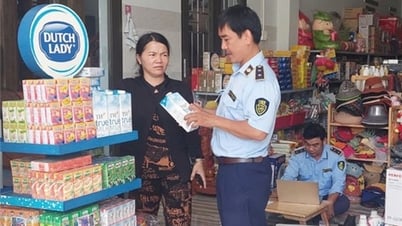Many bad guys have taken advantage of the development of e-commerce to carry out sophisticated scams. Recently, Ms. Tran Thi Truc, Phuoc My ward (Phan Rang-Thap Cham city) ordered goods online. About 2 days later, someone called and said that the shipper had delivered the goods and had delivered them to Ms. Truc's workplace, so she needed to transfer 170,000 VND for the goods. At first, Ms. Truc thought it was real and was about to transfer the money, but because it was lunchtime, she was afraid that no one would be on duty at the office to receive the goods. She called her colleague to confirm if she was at the office and if she saw anyone delivering the goods. She received the answer that no one had delivered the goods. At this time, Ms. Truc knew she had been scammed, but the shipper still called and confirmed that he had delivered the goods, asking Ms. Truc to transfer money according to the message to the account number sent.
Using the same trick, Ms. Nguyen Thi Tinh, Bao An ward (Phan Rang - Thap Cham city) often buys online, so on May 28, while drinking coffee with a friend, she received a phone call informing her that an order of 320,000 VND had been shipped. Then the person claiming to be the shipper asked Ms. Tinh where she was to deliver the goods, but in reality, no order had been delivered. Because Ms. Tinh was not at home, the shipper said that he had left the order inside the door and texted the account number for Ms. Tinh to transfer the money. Without any suspicion, Ms. Tinh transferred the money immediately. When she got home, Ms. Tinh did not see any orders delivered. She realized that she had been scammed. She called the delivery phone number again but could not contact them. She also could not check Zalo because the search was blocked.
The above cases are just two of the few situations that consumers encounter when shopping online. Notably, recently, online hotel, resort, and homestay booking scams have occurred continuously, especially during the summer break, when many families are in need of traveling . The complicated fraud situation has caused significant property damage. Accordingly, the subjects use websites and Facebook pages with interfaces similar to the websites and fanpages of hotels, resorts, and homestays. To increase their "credibility", the subjects also run ads for Facebook pages with tens of thousands of followers, including hotline phone numbers for contact and consultation, create "fake" comments praising the fake Facebook pages, and offer promotional programs with attractive prices... Thanks to that, fake Facebook pages easily attract customers to contact for consultation and transfer deposits.
Recently, Mr. Nguyen Van Ba, a tourist from Hanoi, planned to travel to Ninh Thuan in early June, so Mr. Ba searched for hotels and homestays on Facebook. After seeing a Fanpage named "Homestay Chanh Ranh" in Vinh Hy village, Vinh Hai commune (Ninh Hai) with many interactions and beautiful room pictures, he texted to book a room for 1.7 million VND. After Mr. Ba was instructed to send his name, phone number, and check-in date, the fanpage sent a booking form, asking Mr. Ba to transfer a deposit of 850,000 VND. Checking the booking form, the company's name was written on it, but below it was the red stamp of the Department of Tourism. Seeing many doubts, Mr. Ba immediately called an acquaintance in Ninh Thuan to confirm the Fanpage "Homestay Chanh Ranh" and learned that this page was completely fake.
Another case, Mr. Le Tien Nam, Kinh Dinh Ward (Phan Rang - Thap Cham City) was preparing to travel to Binh Thuan . Afraid of the summer tourist rush, Mr. Nam searched for a hotel online and booked a room for his family before leaving. After transferring the deposit, he received a message informing him that he had transferred the money by mistake and was instructed to click on the link to get his money back. As a result, all the money was deducted from Mr. Nam's account after following the instructions.
These online scams are a profound warning to be alert and vigilant when shopping online and other forms of online fraud. To avoid being scammed, consumers need to be wary of calls and messages asking for money transfers or providing personal information. When shopping online, choose reputable e-commerce sites, carefully check the seller's information and do not transfer money before receiving the goods. Do not follow requests or instructions to transfer money to the subjects for reasons such as incorrect texting syntax, money being stuck on the system. It is necessary to carefully research information, check the transparency of the Fanpage, choose a reputable travel service provider and book available travel rooms on the applications. Once you have checked the accuracy of the contact information, you need to carefully research the tour booking and cancellation policy, and ask the hotel to transfer booking confirmation information.
Online shopping brings many conveniences but also has many potential risks. Consumers need to be more vigilant to recognize fraudulent tricks. At the same time, they need to choose reputable shopping addresses and absolutely do not transfer money without clear verification. In addition, the authorities also need to strengthen propaganda work, strictly handle fraudulent acts to protect consumer rights and maintain confidence in e-commerce.
Red Moon
Source: https://baoninhthuan.com.vn/news/153429p1c30/canh-giac-lua-dao-khi-mua-hang-online.htm




![[Photo] Keep your warehouse safe in all situations](https://vphoto.vietnam.vn/thumb/1200x675/vietnam/resource/IMAGE/2025/10/1/3eb4eceafe68497989865e7faa4e4d0e)
![[Photo] Hanoi morning of October 1: Prolonged flooding, people wade to work](https://vphoto.vietnam.vn/thumb/1200x675/vietnam/resource/IMAGE/2025/10/1/189be28938e3493fa26b2938efa2059e)
![[Photo] President of the Cuban National Assembly visits President Ho Chi Minh's Mausoleum](https://vphoto.vietnam.vn/thumb/1200x675/vietnam/resource/IMAGE/2025/10/1/39f1142310fc4dae9e3de4fcc9ac2ed0)


![[Infographics] An Giang Agriculture 2020-2025: Stable growth, quality transformation](https://vphoto.vietnam.vn/thumb/402x226/vietnam/resource/IMAGE/2025/10/1/bf3a77ba3a0243a697e5253ed4cd6f9c)




















































































Comment (0)